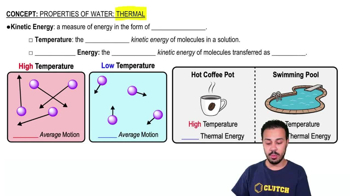
In agricultural areas, farmers pay close attention to the weather forecast. Right before a predicted overnight freeze, farmers spray water on crops to protect the plants. Use the properties of water to explain how this method works. Be sure to mention why hydrogen bonds are responsible for this phenomenon.
 Verified step by step guidance
Verified step by step guidance
Verified video answer for a similar problem:
Key Concepts
Properties of Water

Hydrogen Bonds

Freezing and Insulation

A recent experimental study looked at the combined effects of ocean acidification and increased ocean temperatures, both aspects of climate change, on the growth of polyps, juvenile coral animals. Researchers reported the average polyp biomass (in μg/polyp) after 42 days of growth under four treatments: a control with pH and temperature maintained close to normal reef conditions, a pH lowered by 0.2 units, a temperature raised by 1°C, and a combined lower pH and higher temperature. The results showed that polyp biomass was reduced somewhat in both the low-pH and high-temperature treatments, but the combined treatment resulted in a reduction in growth by almost a third—a statistically significant result. Experiments often look at the effects of changing one variable at a time while keeping all other variables constant.
Explain why this experiment considered two variables—both a higher temperature and a lower pH—at the same time.
This chapter explains how the emergent properties of water contribute to the suitability of the environment for life. Until fairly recently, scientists assumed that other physical requirements for life included a moderate range of temperature, pH, and atmospheric pressure. That view has changed with the discovery of organisms known as extremophiles, which have been found flourishing in hot, acidic sulfur springs and around hydrothermal vents deep in the ocean.
What does the existence of life in such environments say about the possibility of life on other planets?
